Chairs for schoolchildren: varieties, selection rules

Schoolchildren spend a lot of time on homework. Prolonged sitting in an improper sitting position can lead to poor posture and other problems. A well-organized classroom and a comfortable school chair will help you avoid this.
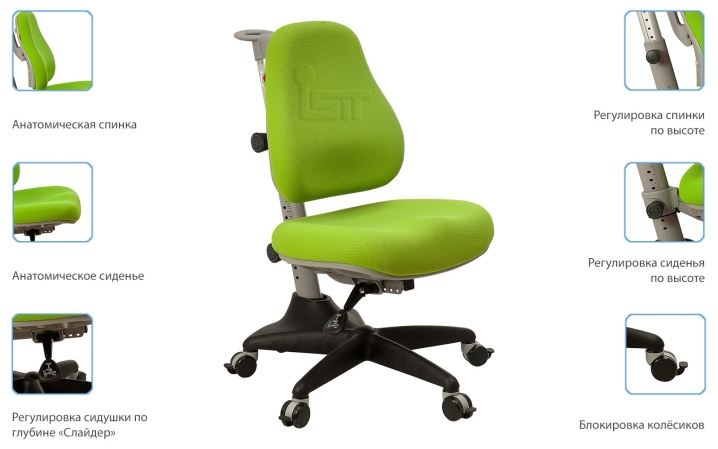
Features, advantages and disadvantages
Formation of posture in a child lasts a long time and ends only by the age of 17-18. Therefore, very it is important from childhood to create conditions for the student to develop and maintain the correct posture by choosing the right student chair.
Currently, the so-called orthopedic school chairs and armchairs are produced. They are designed to prevent the onset of scoliosis and other diseases of the bone skeleton in a child. The design of such chairs is designed for age-related changes in the child's body.
The main feature of these chairs is to ensure the correct angle between the body and the hip of the seated student, which leads to a decrease in the tension of the spinal muscles and the spine.

This is done using a reclining seat.
All child seats must have certain characteristics.
- School chair shape. Modern models have an ergonomic shape. The shape of the backrest follows the silhouette of the spine, and the seat provides a comfortable stay for a long time. The edges of the parts of the chair should be rounded in order to ensure the safety of the child, as well as to exclude the possibility of impaired circulation due to pressure on the blood vessels in the legs.

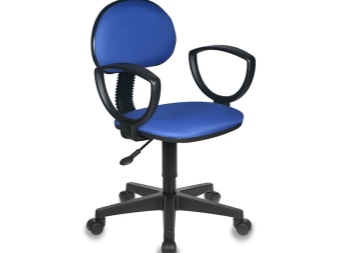
- Correspondence of the chair-chair height to the child's height. The height of the chair, like the height of the table, directly depends on the height of the student, and the chair is selected for each child individually. If a child's height is 1-1.15 m, then the height of the chair-chair should be 30 cm, and with a height of 1.45-1.53 m, it is already 43 cm.

- Ensuring the correct landing posture: your feet should be flat on the floor, with the angle between your calves and thighs should be 90 degrees. But if the child's feet do not reach the floor, then a footrest should be installed.


- The presence of orthopedic properties. The chair-chair should be of such depth and shape that the student's back is in contact with the back and the knees do not rest against the edges of the seat. The correct ratio of the depth of the seat and the length of the student's thigh is 2: 3. Otherwise, the child, trying to take a comfortable position for him, will take a lying position, which is very harmful, since the load on the back and spine increases, leading to its curvature in the future.
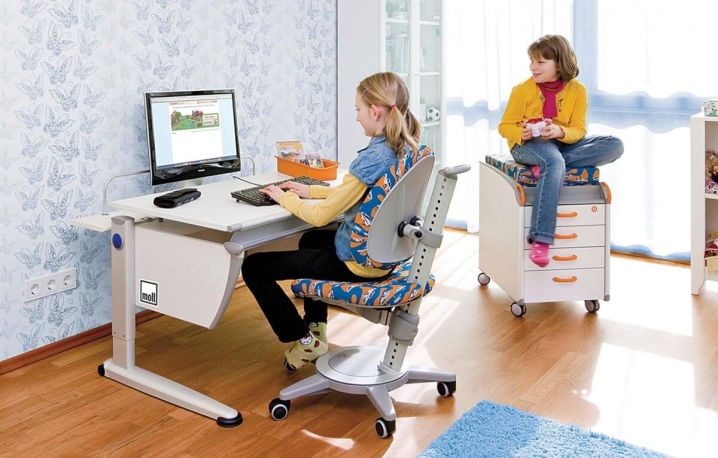
- Security. Chairs for primary school children should have 4 points of support, as they are the most stable. Rotating models can only be used for older children. The supporting body must be metal and the base of the wheelchairs must be weighted to prevent tipping over.

- Environmental friendliness. Materials for the manufacture of individual elements should be only environmentally friendly, durable and high-quality materials - wood and plastic.


The advantages of an orthopedic chair are as follows:
ensures the anatomically correct position of the back, thereby contributing to the formation of correct posture;
prevents the development of various diseases of the musculoskeletal system, organs of vision;
improves blood circulation and blood supply to organs and tissues, prevents overstrain of the muscles of the neck and back and the occurrence of pain;
the ability to correct the position of the back and legs;
comfort during classes, which, by preventing fatigue, prolongs the child's activity and performance;
compact size allows you to save free space in the room;
height-adjustable models can be easily adjusted to the height of any child;
duration of operation of models with height adjustment.
The disadvantages of these chairs can be attributed only to their high cost.

Device
The design of any chair includes several elements.
Back
The back of the chair is designed to support the back and provide reliable support for the child's body, for posture adjustments to correct slouching and slight deviations in posture.
It must be anatomically correct.

In accordance with the design features, there are these types of backs.
Plain solid. It fully corresponds to its functional purpose, fixing the student's body in the best way.
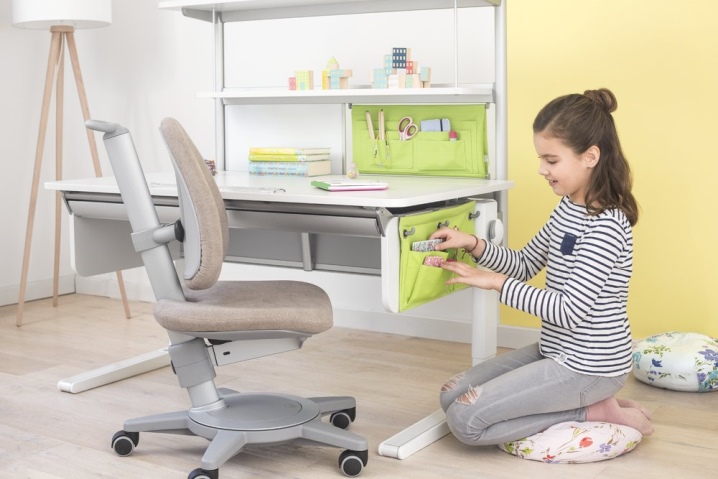
Double construction. This type is intended for children with correct posture and not having any of its violations. The back consists of 2 sections, which allows the spinal muscles to relax without changing the position of the spine and excluding the development of its curvature and the formation of a stoop.


Backrest with bolster. Such models provide additional support for the back.

Sitting
It is also an important element in the design of the chair. It should be firm enough for the child to sit upright. Sitting in shape can be anatomical or ordinary. The anatomical appearance has additional padding seals in certain places to create the correct body silhouette.

Armrests
The armrests are not required for the child seat. Usually, chairs are released without them, since when children lean on them, they have a stoop. Correct physiological posture while working at the desk requires the position of the forearm on the table top and does not allow the presence of armrests as additional support for the hands.
But there are models with this element. Armrests are of different types: straight and inclined, with adjustment.
Adjustable armrests with adjustable height and tilt horizontallysetting the most comfortable elbow position.

Upholstery and filling
The task of this structural element is not only to create a beautiful appearance of furniture, but also to ensure the comfort of the child during classes. The cover of the child seat must be breathable and hypoallergenic and must not require complex maintenance.
Often, models are covered with natural leather, eco-leather or fabric. The best option is fabric and eco-leather upholstery, as they quickly acquire the temperature of the child's body. Caring for them is very simple: dirt can be removed with a damp cloth.

Padding, thickness and quality affect the softness and comfort of the seat and backrest. On a seat with a very thin layer, it is hard and uncomfortable to sit, and with an excessively thick layer of padding, the child's body will sink too much into it. The best option for the thickness of the packing is a layer of 3 cm.

Used as a filler:
- foam rubber - it is an inexpensive material with good air permeability, but it does not differ in durability and does not last long;

- polyurethane foam - has greater wear resistance, but also has a higher cost.

Base
The design principle of the base of the chair is a five-beam. The reliability and quality of the base directly affect the usability of the product and the durability of its operation. The material for the manufacture of this element is steel and aluminum, metal and wood, plastic.


The stability of the chair depends on the size of the base diameter. The child seat must not be less than 50 cm in diameter. The shape of the base is different: straight and curved, as well as reinforced with metal bars.


Footrest
This structural element acts as an additional support for the body, which prevents back fatigue. Muscle load moves from the spine to the legs, which promotes muscle relaxation. The width of the stand should match the length of the child's foot.



Adjustment
Models can be adjusted. Its purpose is to install certain structural elements in the most comfortable position for the child. The adjustment is carried out using the following devices:
- permanent contact - designed to correct the height and angle of the backrest;

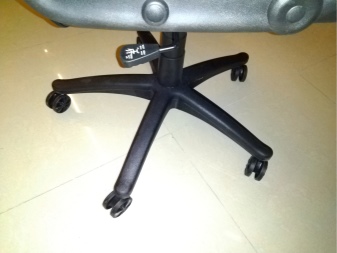
- spring mechanism - provides support and support for the backrest and adjusts its inclination;

- swing mechanism - helps to relax if necessary, and after the end of the swing, the chair is set to its original position.
The seat height is adjustable by means of a gas lift.

Varieties
There are 2 types of school chair for a child - classic and ergonomic.
The classic chair with a one-piece solid back has a rigid structure that fixes the child's posture. The design of this model does not allow asymmetry in the shoulder girdle and additionally has a special support at the level of the lumbar spine. While securely fixing the position of the body, the chair still does not have a full orthopedic effect.

It can additionally have the following elements:
an ergonomic back and seat equipped with an adjustment lever;
footrest;
hinges;
headrest.


Since such models do not have a full orthopedic effect, it is not recommended to use them for a long time for first-graders schoolchildren.
Ergonomic student chairs are presented in the following types:
Orthopedic knee chair. The design looks like an inclined chair. The child's knees rest on a soft support, and his back is securely fixed by the back of the chair. In this position, the child's muscle tension moves from the spine to the knees and buttocks.
Models can have adjustment of the height and tilt of the seat and backrest, they can be with castors, which allows them to be easily moved, as well as with locking wheels.


Orthopedic model with double back. The backrest consists of 2 parts, vertically separated. Each part has the same curved shape to closely follow the outline of the baby's back. This backrest design evenly distributes muscle tension on the spine.

Transformer chair. The advantage of this model is that it can be used for a long time. Such a working chair for a student has a seat height and depth adjustment, which makes it possible to choose the right position for any child, taking into account his height and anatomical features.
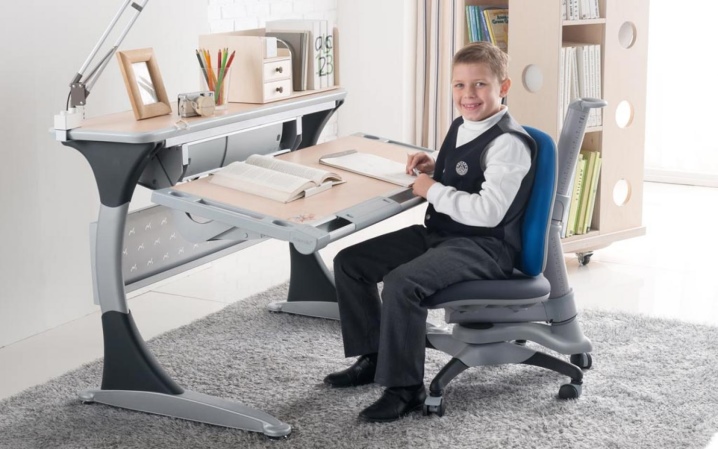
Sitting-Standing model. This view is exclusively for high school students. The model has a fairly large height. In such a chair, the teenager's legs are almost straightened, and the lumbar and pelvic regions are securely fixed in the chair, which eliminates the asymmetry of the posture.

Balance or dynamic chair. The model looks like a rocking chair without armrests and backrests. The design has the ability to move without allowing long motionless sitting. In this case, the load on the spine is minimal, since there is no static posture of the body.

Manufacturers
The children's furniture market is represented by many manufacturers. In the production of student chairs, such brands have proven themselves better than others.
Duorest
Country of origin - Korea. The most popular writing chairs with wheels of this brand are:
Kids DR-289 SG - with a double ergonomic backrest and all kinds of adjustment, with a stable crosspiece and 6 castors;

- Kids max - with an ergonomic seat and backrest, adjustment mechanisms and a removable, height-adjustable footrest.

Mealux (Taiwan)
The range of child seats of this brand is very wide and is represented by models for different ages:
Onyx duo - has an orthopedic back and seat and wheels with automatic locking;

- Cambrige duo - model with a double back, adjustable seat and back, rubberized castors.

Ikea
School chairs of this brand are considered a quality standard. All models are ergonomic:
"Marcus" - a working chair for a desk with a mechanism for adjusting the elements and their fixation, with additional support in the lumbar region and 5 castors with blocking;

- "Hattefjell" - model on 5 castors with armrests, swing mechanism, backrest and seat adjustment.

In addition to these brands, high-quality furniture for schoolchildren is also produced by such manufacturers as Moll, Kettler, Comf Pro and others.
How to choose the right study chair?
Modern children spend a lot of time at home sitting at the table, doing their homework, or just at the computer. Therefore, it is so important to find the right chair-chair for your practice. By design, the chair should be stable, comfortable and reliable. First of all, you should pay attention to the ergonomics of the model.
The back of the chair-chair should reach the middle of the shoulder blades in height, but not higher, and its width is wider than the back of the child. The seat should be moderately firm. It is better to choose school chairs with an orthopedic seat and backrest, which are adjustable in height and depth. It is desirable that the model has a footrest.

When choosing a chair-chair for a child of 7 years old, it is better to choose a model without wheels and armrests and give preference to a transforming chair. It is desirable that the seat has a thickening along the edge: this detail will not allow the child to move out of the seat. For junior schoolchildren, it is recommended to purchase a chair, adjustable in height, paired with a transforming desk.
For a teenager and high school student, you can purchase a study chair with wheels paired with a desk. When choosing such a model, it should be remembered that there should be no less than 5 wheels. They must necessarily have a lock.
If the chair-chair does not have height adjustment, then the model should be selected in accordance with the student's height. When choosing a chair that is adjustable in height, you should check the availability of adjustment mechanisms and their operation. It is desirable that the model be equipped with a gas lift and shock absorption.

You also need to pay attention to the stability of the model. It is better if the base is made of steel or aluminum, and additional elements are made of plastic and wood: armrests, adjustment knobs, wheels. It is unacceptable for the model to tilt strongly (by 20-30 degrees) under the influence of the child's weight: this can lead to the chair overturning and injuries to the child.
All models must have certificates, which are kept until sold by the seller.
If the child has any diseases of the back and spine, you should first consult with an orthopedist.
How to choose an orthopedic chair for a student, see below.













The comment was sent successfully.